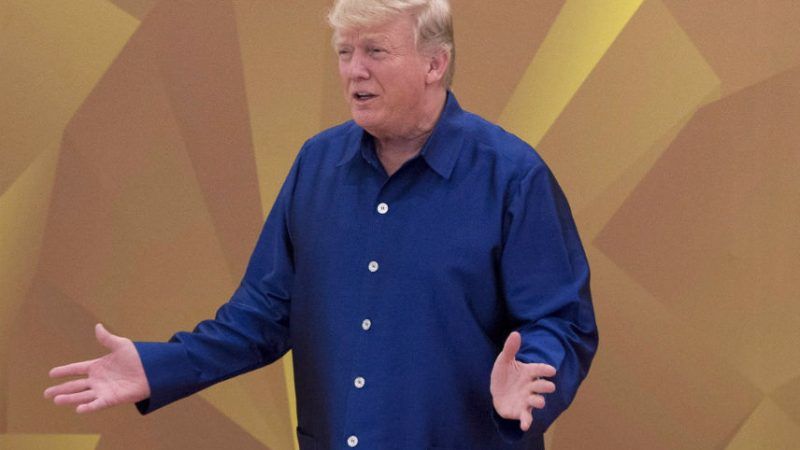Trump Trade Speech Undermines Beleaguered Free Trade Consensus
Free trade benefits all participants.

President Trump raised some valid concerns about America's trade relations with the rest of the world in a speech at the Asia-Pacific Economic Cooperation Summit in Vietnam on Friday. For example, it's true that U.S. firms are subjected to intellectual property rights violations and industrial espionage by foreign state-affiliated actors.
Unfortunately, Trump's speech was both economically illiterate and factually incorrect. It's likely to undermine what remains of the pro-free trade consensus and embolden those on both sides of the U.S. political spectrum who advocate in favor of prosperity-destroying protectionism.
The case for free trade has been clear for 200 years, since David Ricardo described what has come to be known as the "theory of comparative advantage." Ricardo's 1817 theory, which I have discussed in greater detail elsewhere, states that a country should produce and export only those goods and services which it can produce more efficiently than other goods and services, which it should import. To be fair to Trump, he did, on a number of previous occasions, note that he loves free trade. Regrettably, love does not equal understanding.
Take, for example, Trump's concern over America's "trade imbalance" with China. According to Trump, "the current trade imbalance [with China] is not acceptable."
"I do not blame China or any other country, of which there are many, for taking advantage of the United States on trade," Trump said in his Vietnam speech. "If their representatives are able to get away with it, they are just doing their jobs."
But is the trade imbalance as much of a problem as Trump implies? No, because as any student of economics knows, there is a direct relationship between trade balance on the one hand and the savings and investment balance on the other hand. The relevant accounting formula here is: Savings - Investment = Exports – Imports.
It's true America sells less to the rest of the world than it buys from it. But the United States also receives more capital from overseas than Americans send abroad. Trade balance and capital balance must be equal over the long run, because the American dollars that foreigners earn by selling to Americans can only be spent in so many ways. Foreigners can convert the American currency into local currency, thereby driving up the price of the local currency and driving down the price of the U.S. dollar. That then translates into more competitive U.S. exports and, consequently, lower trade imbalance. Or they can invest their export earnings in U.S. assets—ranging from U.S. government bonds to San Francisco apartments.
Lo and behold, China is hemorrhaging capital at a record speed, and some of that Chinese money is coming to America. China, for all of its growing economic might, is still a country with dodgy property rights and an underdeveloped rule of law. Its government is even more opaque and less predictable than our own. By sending some of their money overseas, in other words, Chinese people and corporations are hedging against expropriation and drastic changes in economic policy. The United States, with its relatively well-developed institutions and investment-friendly policies is, comparatively speaking, a safe haven.
"I wish," Trump continued in his speech, that "previous administrations in my country saw what was happening and did something about it. They did not, but I will. From this day forward, we will compete on a fair and equal basis. We are not going to let the United States be taken advantage of anymore. I am always going to put America first the same way that I expect all of you in this room to put your countries first." To be fair, Trump appears to be referring to the uncompetitive practices that I referred to in the opening paragraph. But, a less-than-careful listener would be justified in concluding that free trade is a zero-sum game, where one country's gain is another country's loss.
This is dangerous stuff. For all of its many imperfections, international trade is not only an engine of material progress throughout the world but also a driver of economic interdependence, which makes military conflict less likely. Chimerica, a portmanteau coined by Stanford University's Niall Ferguson, refers to the state of mutual economic dependence between two of the world's most powerful countries—China and America. The relationship between these two will to a great degree determine whether the 21st century can be a peaceful and prosperous one. It's important to get it right!


Show Comments (75)